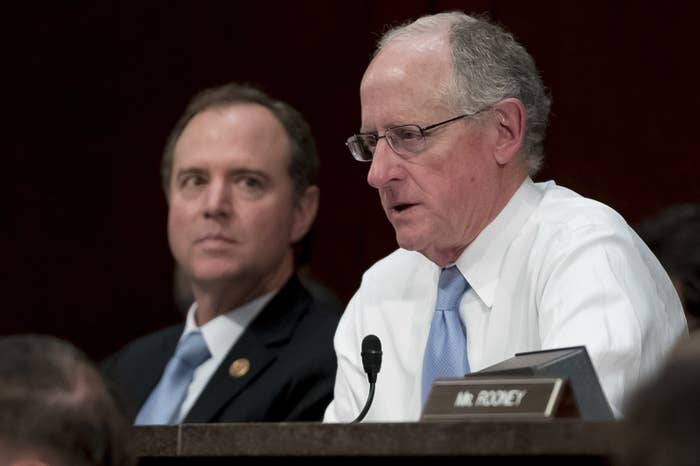
The House Intelligence Committee is wrapping up its investigation into Russian interference during the 2016 election with Republicans saying they found no evidence of collusion with the Trump campaign, the Republican leading the probe announced Monday.
Texas Rep. Mike Conaway, who is leading the committee’s Russia probe, on Monday released a one-page summary of the committee’s findings, saying that, while the committee found evidence that Russia interfered in the 2016 election, “[w]e have found no evidence of collusion, coordination, or conspiracy between the Trump campaign and the Russians.”
President Trump had an all-caps reaction on Twitter to the news, but did not note it was only Republicans who made the assessment.
THE HOUSE INTELLIGENCE COMMITTEE HAS, AFTER A 14 MONTH LONG IN-DEPTH INVESTIGATION, FOUND NO EVIDENCE OF COLLUSION OR COORDINATION BETWEEN THE TRUMP CAMPAIGN AND RUSSIA TO INFLUENCE THE 2016 PRESIDENTIAL ELECTION.
Republicans also said they disagreed with part of a January 2017 assessment from the intelligence community that said Russian President Vladimir Putin favored Trump in the 2016 election, according to the summary.
California Rep. Adam Schiff, the top Democrat on the committee, blasted Republicans' decision to wrap up the investigation, calling the move "premature."
"While the Majority members of our committee have indicated for some time that they have been under great pressure to end the investigation, it is nonetheless another tragic milestone for this Congress, and represents yet another capitulation to the executive branch," Schiff said in a statement. "By ending its oversight role in the only authorized investigation in the House, the Majority has placed the interests of protecting the President over protecting the country, and history will judge its actions harshly."
Schiff pointed to Trump associates and Russian nationals who have been indicted as part of special counsel Robert Mueller's ongoing investigation into Russian interference and potential collusion with the Trump campaign. Schiff also said that the committee's work was "fundamentally incomplete," citing "credible allegations of Russian money laundering" that had been "barely touched" and an unwillingness from Republicans to use the committee's subpoena powers to obtain documents and correspondence from key witnesses.
Schiff also disagreed with Republicans' assertion that Russia did not favor Trump in the last presidential election and sought to damage Hillary Clinton's campaign. "On those issues, the evidence is clear and overwhelming that the Intelligence Community Assessment was correct," Schiff said.
According to Monday’s summary, Republicans on the committee have written a draft report that’s more than 150 pages long and contains more than 40 “initial findings” about “Russian cyberattacks on U.S. political institutions in 2015–2016 and their use of social media to sow discord,” a “lackluster pre-election response to Russian active measures,” “[p]roblematic contacts between senior Intelligence Community officials and the media,” and more.
The summary also said the draft report includes more than 25 recommendations to Congress to combat Russian election meddling in the future.
The Republican summary said they will share the draft report with Democrats on Tuesday “for review and comment.” After the committee adopts the report, “it will be submitted for a declassification review, and a declassified version will be made public,” the summary said.
Conaway said in a statement that Republicans would now begin working with Democrats on the committee to write “a report to give the American people answers to the questions they’ve been asking for over a year” about Russian interference, ahead of the midterm elections in November.
“I look forward to working with Ranking Member Schiff on this next phase of our investigation. The American people deserve our cooperation, and our transparency.”
Schiff, for his part, said that when it comes to "protecting the country going forward [...] we will endeavor to continue our work, with or without the active participation of the Majority."
There was speculation last week that the committee’s follow-up interview with President Donald Trump’s former campaign manager Corey Lewandowski might be the final interview in the investigation. But Conaway declined to comment at the time.
Corey Lewandowski leaves his second interview with the House Intel Committee, says "it went great" and that he answered "every relevant question." "I spent 12 hours of my life I'll never get back," he said, referring to the total time he's spent with the committee. https://t.co/3nzYh0lDlu
The House Intelligence Committee’s investigation had been all but derailed by partisan sniping and, most recently, a set of dueling partisan memos about alleged government abuse of spying laws.
Members of both parties have also frequently accused one another of leaking information about witness testimony to the press. Earlier this month, the leaders of the Senate Intelligence Committee — which has maintained a bipartisan approach to its Russia probe — reportedly came to the conclusion that Republicans on the House Intelligence Committee were behind the leak of text messages belonging to Sen. Mark Warner, the top Democrat on the Senate committee.
But even before that, Democrats on the House Intelligence Committee had called for the removal of committee chair Devin Nunes — who partially stepped aside from the investigation in April amid an ethics investigation into leaks — while Republicans have accused Rep. Adam Schiff, the committee’s top Democrat, of grandstanding and appearing on television too frequently.
Earlier in the investigation, the committee held a handful of public hearings, including one in which then–FBI director James Comey publicly confirmed that the bureau was investigating potential links between the Trump campaign and the Russian government.
The committee has also heard from 73 witnesses, including former Trump campaign foreign policy adviser Carter Page, former top White House strategist Steve Bannon, and White House communications director Hope Hicks.
Meanwhile, the Senate Intelligence Committee continues its investigation. Committee leaders say they are planning to release a report and hold a public hearing on election security before the 2018 midterm season heats up. It’s unclear when the Senate committee will wrap up its investigation and release a final report on its findings.

